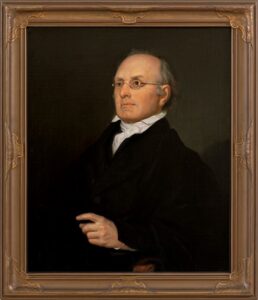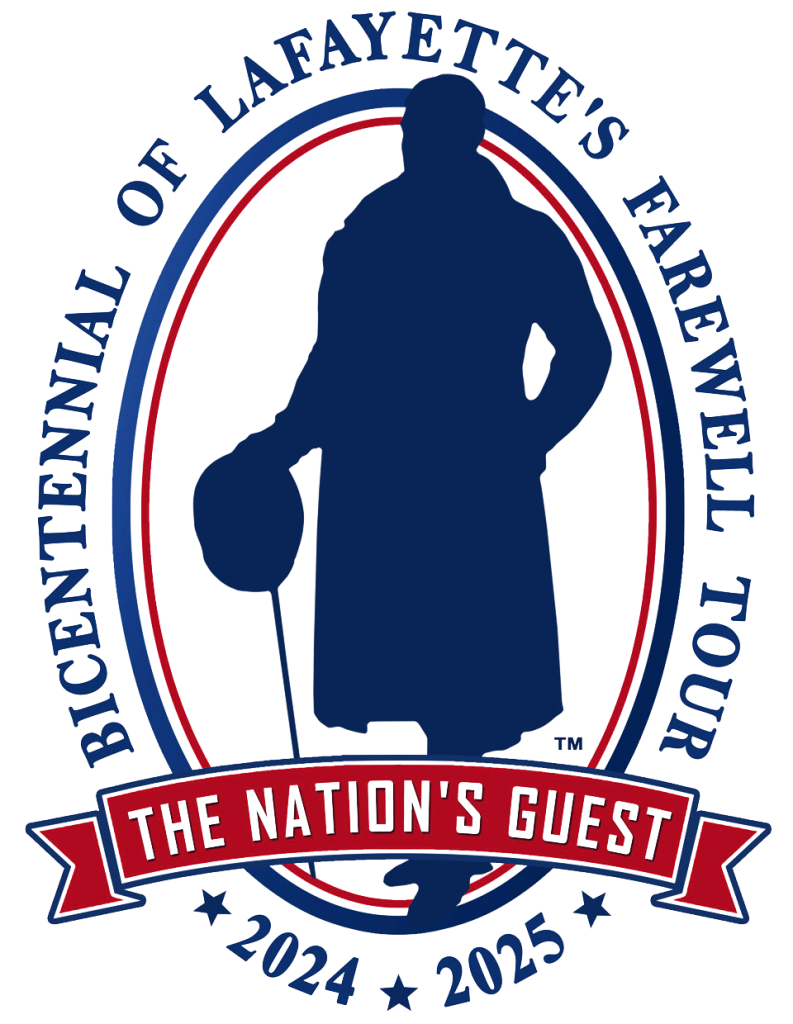This is part of a series on Lafayette’s visit to Massachusetts August 23, 1824 to September 3 1824.
Salem’s military display on August 31 was somewhat limited because much of its militia was in Boston or on the way back from the August 30 militia encampment on Boston Commons.
The selectmen and the Committee of Arrangements. Colonel Putnam Chairman of the Selectmen received the party attended by Colonel Harris and Everett General Appleton. A battalion of cavalry under Major Dodge formed the escort.
Lafayette road in a barouche with Judge Story, President of the day. The procession was under the orders of Edward Landers. Colonel Peabody’s Artillery posted upon rising ground fired a salute. They entered town by South Bridge as another salute was fired and the escort was joined by a battalion of Light Infantry composed of Captain Pulsifer’s Salem Mechanic Light Infantry, Captain Sutton’s Danvers Light Infantry and the Salem Light Infantry under Lt. Hodges. Captain Cloutman of the Salem Light Infantry was in overall command of the battalion. On the plain above the bridge there were two hundred sailors in neat uniform with Lafayette ribbons on their hats.
Many arches were erected including one in sight of the spot where Colonel Leslie was repulsed in his attempt to seize field pieces in February 1775, the first check of British military force in the Revolution.
There were arches over the east and west gates of Washington Square. There were about one thousand children each bearing on his breast a portrait of Lafayette. The inscription of the gate was “Children welcome with joy the illustrious benefactor of their Fathers. Kids were shouting “Welcome Lafayette” ignoring the heavy rain.
When the General entered the town he was in an open barouche. Judge Story riding with him had thrown a cloak over him and held an umbrella over his head. When Lafayette saw the women and children greeting him entirely exposed to the rain, he threw off the cloak and refused the umbrella, so when he arrived at the coffee house he was as drenched as everyone else.
From Washington Square the procession passed to Lafayette Coffee House on Essex St. Lafayette and his suite and others were on stage in front of the house.
Judge Story addressed Lafayette
Judge Story addressed Lafayette:
GENERAL LA FAYETTE
Sir-Forty years have elapsed since the Inhabitants of this town had the pleasure to welcome you within its limits. Many, who then hailed your arrival with pride and exultation have descended to the grave, and cannot greet you on your long desired return. But, thanks to a good Providence, many are yet alive, who recollect with grateful sensibility the universal joy of that occasion. Your disinterested zeal in embattling in a cause, deemed almost hopeless – Your personal sacrifices in quitting a home endeared by all the blessings with which affection and virtue can adorn life – Your toils and perils in the conflicts of war and vicissitudes of a discouraging service – Your modest dignity and enthusiasm on receiving the homage of a free people – These were all fresh in their memories, and gave an interest to the scene, which cannot be described, in the presence of some, venerable in age and character, who were the delighted witnesses of that interview, and whose hearts again glow with the feelings of that happy day.
To us of a younger generation – the descendants of your early friends and companions in arms – a different, but not less interesting privilege belongs. We are allowed the enviable distinction of meeting, in his riper years, One, whom our Fathers loved in their youth. We welcome you to your country – to our homes – to our hearts. We have read the history of your achievements – your honours – and your sufferings. They are associated with all that is dear to us – with the battle grounds consecrated by the blood of our heroes – with the tender recollections of our departed statesmen – with the affectionate reverence of our surviving patriots. Can we forget that we were poor and struggling alone in the doubtful contest for Independence, and you crossed the Atlantic at the hazard of fortune and fame to cheer us in our resistance? That you re-crossed it to solicit naval and military succours from the Throne of France and returned with triumphant success? That your gallantry in the southern campaigns checked the inroads of a brave and confident enemy? That your military labors closed but with the surrender at Yorktown, and thus indissolubly united your name with the proud events of that glorious day, We cannot forget these things, if we would – We would not forget them if we could. They will not be forgotten, until America ceases to be a Nation.
But we have yet higher sources of gratification on the present occasion. You have been the friend, not merely of America, but of France, and of the cause of Liberty throughout the World. During a long life an in the most trying scenes you have done no act for which virtue need blush or Humanity weep. Your private character has not cast a shade on your public honors. In the palaces of Paris and the dungeons of Olmutz, in the splendor of power, and the gloom of banishment you have been the fried of justice and the assertor of the rights of man. Under every misfortune you have never deserted your principles. What earthly prize can afford consolations like this? The favor of Princes and the applause of Senates sink into absolute nothingness in comparison with the approving conscience of a life devoted to the good of mankind. At this very moment you are realizing the brightest visions of your youth in the spectacle of ten millions of people prosperous and happy under a free government, whose moral strength consists in the courage and intelligence of its citizens. These millions welcome you to the shores of the West with spontaneous unanimity; and the voice which now addresses you, feeble as it is, repeats but the thoughts that are ready to burst for the lips of every American.”
Lafayette replied
“On my happy return to the shores of liberty, I had anticipated the pleasure to revisit the town of Salem, to witness her so much increased prosperity, to recall with surviving old friends our revolutionary recollections. But in the affectionate welcome of the new generations, I find additional causes for delightful gratification.
You have pleased, Sir, to allude to several circumstances of my life. The first of them I have shared in common with my dear companions during our American glorious struggle. In the transactions of another hemisphere, I have made it a constant object not to be unworthy of the American education it has been my happy lot to receive.
I request you, Sir, the gentlemen of the Committee, and the citizens of Salem, to accept of the respectful thanks of a grateful and very anciently affectionate heart.”

Joseph Story was born in Marblehead and graduated from Harvard in 1798. He served in the Massachusetts legislature. In 1812 he became a US Supreme Court Justice. Lafayette would no doubt have been pleased with Judge Story’s 1841 opinion in the matter of The United States v Amistad which called for the freedom of Africans who had taken over the ship Amistad on which they were being transported in violation of the laws against the slave trade. John Quincy Adams represented the Africans.
At three o’clock a battalion of Light Infantry escorted Lafayette to Hamilton Hall.
At Hamilton Hall three hundred gentlemen partook of a sumptuous dinner. Judge Story presided assisted by Judge Putnam, N. Silsbee, Willard Peele, B.W. Crownshield, John Pickering and Stephen White. The ladies of Salem had done the decorations – wreaths and festoons of flowers and evergreens encircling the inscription:
“Welcome, welcome, be the brave to the homes he fought to save. LAFAYETTE, our friend in times which tried men’s souls – La Grange – Mount Vernon – LAFAYETTE IN AMERICA – O’u peut-on etre mieux – Qu’au sein de sa famile,
Among the invited guests were General Dearborn, his Excellency the Colombian Minister, Colonel Pickering, Colonel Lee, Colonel Harris, Colonel Everett, General H.A.S. Dearborn, General Wingate and the ordained clergy of the town.
There was a bust of Washington crowned with an olive wreath, the American Eagle holding a crown over the head of Lafayette, an elegant arch supported by columns containing the names of the Presidents of the United States.
Around 5:30 Lafayette left the hall attended by a deputation of the Committee of Arrangements who were instructed to accompany him to Ipswich, but the General asked the committee to dispense with that attention on account of the inclemency of the weather. A battalion of cavalry escorted him out of the town.
For information on the bicentennial of Lafayette’s tour check out lafayette200.org.































































































